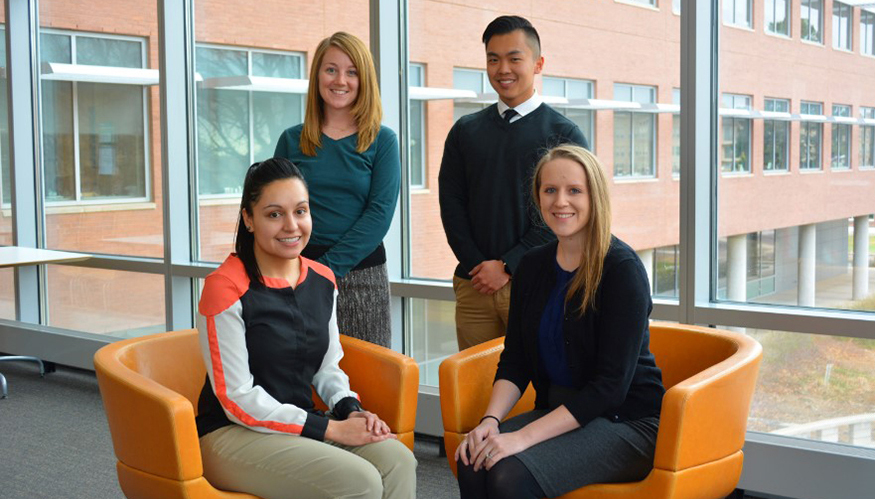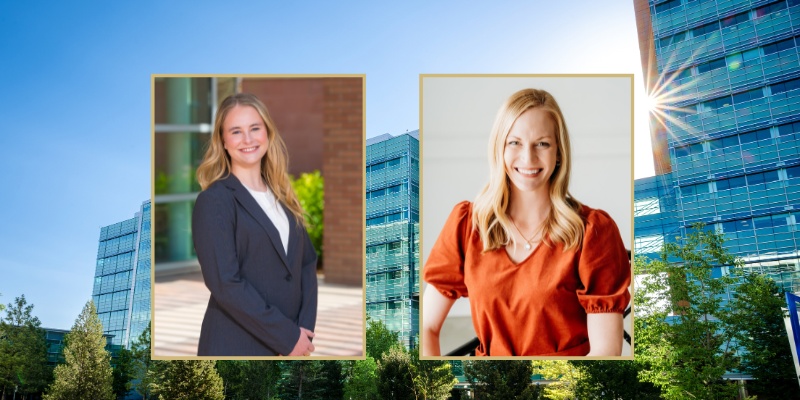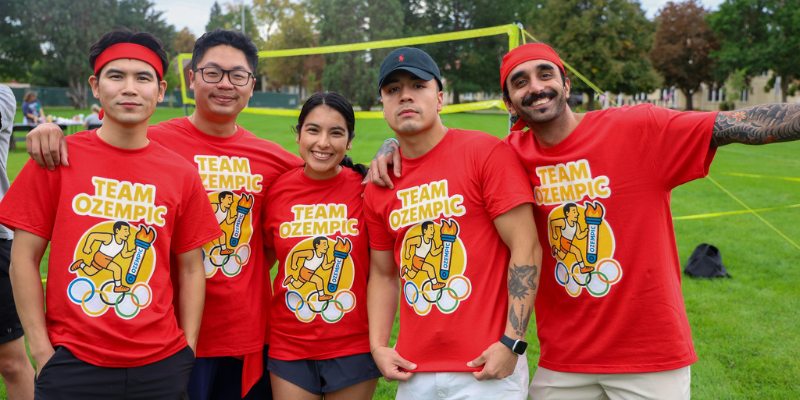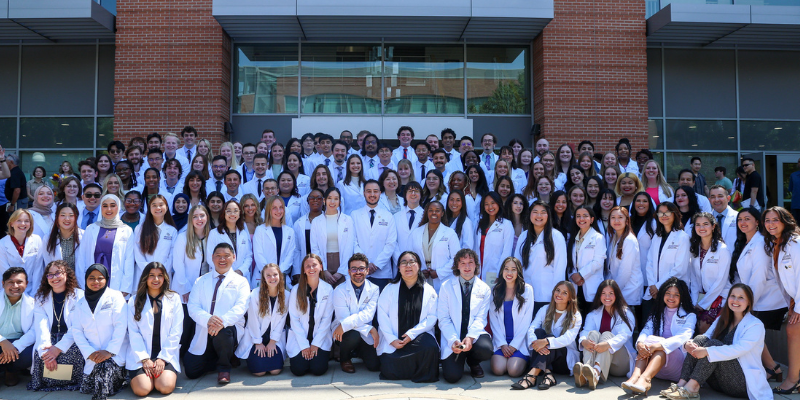Students at the CU Anschutz Skaggs School of Pharmacy and Pharmaceutical Sciences continue to impress. While one group was recognized for its work with underserved residents of Aurora, another was continuing a strong tradition in the Medisca Student Pharmacist Compounding Competition.
Pharmacy compounding is the art and science of preparing personalized medications for patients. Compounded medications are made from ingredients that are mixed together in the exact strength and dosage form required by the individual patient. This method allows the compounding pharmacist to work with the patient and the prescriber to customize a medication to meet the patient’s specific needs.
National leaders in compounding
The Medisca competition was started six years ago to provide an educational experience for student pharmacists and increase their exposure to the overall pharmacy compounding industry. Over the last three years, CU Anschutz student pharmacists have dominated. This year, Adam McHenry, Cara Fossum and Brandon Petticone teamed up with faculty advisor Peter Rice, PharmD, PhD, to bring home second place for the second year in a row. CU Anschutz students won the competition in 2014.
“It’s something to be very proud of and is setting our school apart from all the other pharmacy schools,” said third-year pharmacy student McHenry. “Dr. Rice has done an amazing job supporting our compounding teams and leading us to success.”
DAWN in Aurora
Another effort that’s setting the school apart, is its contributions to the DAWN Clinic (Dedicated to Aurora’s Wellness and Needs) in Aurora. The clinic opened in March 2015 in the Fields Foundation’s Opportunity Center and is a collaboration between all the health sciences schools and colleges at CU Anschutz. The student-led and faculty-mentored DAWN Clinic is showing students headed into the health professions what they can accomplish when they work together to provide care to underserved members of the community.
“Many of our patients come to us after spending years without ever seeing a physician with many uncontrolled medical conditions,” said fourth-year pharmacy student Geremi Boom. “It takes a team of interdisciplinary students to address the many concerns our patients frequently arrive with. This model of care allows us the opportunity to not only promote the value of our own profession (pharmacy), but also create an environment of mutual respect for other's professions.”
“Patients benefit from having access to basic healthcare,” said third-year pharmacy student Claudia Corona. “But they also benefit from having a compassionate team of professional students that are willing to go the extra mile in order to address their needs.”
National leaders in engaged service
The significant contributions to the clinic by Corona, Boom, David Choi and Katie Derington have brought them national recognition. Their team of student pharmacists is one of just four in the country selected for an Engaged Service Award by the American Association of Colleges of Pharmacy (AACP).
“The community engagement programs we recognize this year demonstrate the broad and deep connections between our members and vulnerable communities,” said AACP Executive Vice President and CEO Lucinda L. Maine, PhD, RPh. “The focus on serving vulnerable populations and creating a diverse pipeline of future learners is remarkable.”
The DAWN Clinic was conceptualized and developed by students and is run by students. It’s a partnership between the Aurora community and the CU Anschutz Medical Campus and is open to uninsured, adult patients every Tuesday night.
Opening night
Boom and Choi both point to their first shift at the clinic as a good example of the services the collaborating students can provide and the impact they have on the patients and community. At the end of the night, the student volunteers were closing up when they noticed an elderly woman walking with the assistance of two young adults. She’d fallen in the middle of the street, didn’t know how to get home and only spoke Korean.
“The pharmacy students and medical students came together as a team,” Boom said. “Someone was able to translate, we cleaned her scrapes, we found out where she lived and we delivered her home.”
“I remember walking down an alley after we had dropped her off with her daughter,” said Choi. “I turned the corner and there was the DAWN Clinic, a beacon in the night, ready to ensure the wellness of the community around us. This is a shining example of who we are. We are no longer perpetuating the idea of silos of professions, but rather a single silo of collaborative patient care in which we are all one in the same”
Priceless lessons
Depending on the demands of their studies, the student pharmacists often volunteer 40 hours or more at the clinic each month. They consider the experience to be priceless in their educational journey.
“My work with DAWN has been the defining experience of my pre-professional career,” said Derington. “I’ve learned so much about leadership, volunteerism, community engagement, project management, inter-professionalism, advocacy, teamwork, mentorship, organization, communication, healthcare systems and so much more! I feel confident that I can take what I’ve learned and use it to improve other communities and make even more of an impact on my world.”
Student impact
The AACP award was given to the students in recognition of their successful efforts in providing primary care services to the underserved, building healthy and effective inter-professional relationships between trainees and promoting student involvement and leadership with community-based initiatives. Receiving it was gratifying and empowering.
“So often as students, we feel powerless by our ‘student’ status,” said Derington. “But, even without a degree, we have so many skills and so much passion. This award is unique because it recognizes that student pharmacists can and do impact the communities around them. It encourages students to envision their own communities of the future to enact change.”
Aurora’s underserved and uninsured residents, its refugees and undocumented immigrants, make up the community these students are currently serving and caring for. The students offer free medical care. They provide access to food, housing and employment resources. They are building community wellness and making a difference.
Commitment to community wellness
”Healthcare is important for any human being,” said Corona. “The fact that we are willing to say all inhabitants deserve care regardless of the social barriers they may face— that’s an important ideal for the future of the colorful and morphing city that is Aurora”
“I think if you polled any of our volunteers they would say the reason they continue to volunteer is because of the patient population,” said Boom. “Providing care services to the underserved is personally fulfilling and motivating. Many of our patients have gone years without medical care and they frequently arrive with many health concerns. Because we are a group of interdisciplinary health sciences students, we are able to address the concerns as a team. We don’t exclusively operate within our own silos but rather come together to provide care that encompasses all of the patient's needs.”
Shaping the future
“This clinic has changed how I will practice as a pharmacist,” said Choi. “I have seen firsthand the future of healthcare. We brought a change to our campus to ensure the success of inter-professional collaboration in providing care. As healthcare grows more complex every day, healthcare must adapt to the challenges we are facing today.”
From engaged service to compounding, CU Anschutz is preparing student pharmacists to help shape the future of healthcare. And, while awards and recognition are appreciated and celebrated, improved community wellness is the real winner.



